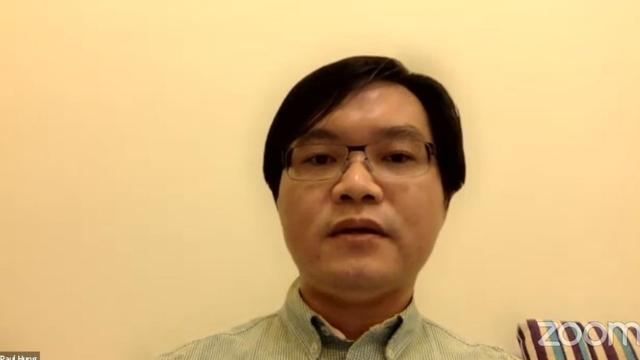The nightmare started on December 19, 1996. Solidarity with Tai Ji Men is now a global phenomenon.
by Alessandro Amicarelli

December 21, 2021, came after the 25th anniversary of the arrest of Dr. Hong Tao-Tze, the leader of Tai Ji Men, his wife, and two dizi (disciples) on December 19, 1996, and after the International Human Solidarity Day, celebrated every year by the United Nations on December 20.
CESNUR and Human Rights Without Frontiers organized on December 21 yet another of their by-monthly webinars on the Tai Ji Men case. It was introduced by Marco Respinti, director-in-charge of Bitter Winter, who recalled the tragic events of 1996, and how Dr. Hong and his co-defendants were finally found innocent of all charges by Taiwan’s highest courts. Respinti also summarized the main events of the Tai Ji Men case, and mentioned a letter recently sent by 25 international scholars and human rights activist to Taiwan’s President Tsai Ing-wen, urging her to solve the Tai Ji Men case. He then introduced a video on the tragic events of December 19, 1996, their aftermath, and the protests.
Angelica Bertino, an Italian attorney, member of the committee for inter-religious dialogue Fedinsieme (Faiths Together), and of ORLIR, the International Observatory of Religious Liberty of Refugees, observed that an essential feature of human solidarity is solidarity with those persecuted for their religion or belief. Many believe that detention and executions are the only ways of persecuting a spiritual group, Bertino said, but this is in fact not the case. Spreading false rumors against a group is just as effective as arresting its members.
Even the persecution of Christians in the Roman Empire was preceded by a massive campaign of slander. And the most modern way of persecuting a spiritual minority is through the improper use of taxes. Both arrests and slander were used against Tai Ji Men, Bertino added, but they did not succeed in destroying the movement, so the powerful weapon of taxes was and continues to be used.
Massimo Introvigne, an Italian sociologist who is also the editor-in-chief of Bitter Winter, mentioned that the webinar was held while many in the world were preparing for Christmas. That miracles happen in that day, he said, is an idea spread to millions of readers of the most famous Christmas story in Western literature, A Christmas Carol, which British novelist Charles Dickens published in 1843. Millions throughout the world are also familiar with the comics created for Walt Disney by Carl Barks and his character Uncle Scrooge, whose name is derived from the man at the center of Dickens’ tale, Ebenezer Scrooge, and whose first story also happens at Christmas.
Reflecting their authors’ criticism of organized religion, Introvigne said, both Ebenezer and Uncle Scrooge miraculously turn from greedy misers to kind and charitable characters at Christmas, but their conversion happens in a secular rather than a Christian context. Yet, the idea that miracles become possible in special days is inherently religious. Introvigne stated that he has witnessed two miracles in the Tai Ji Men case, first, the dizi’s resilience in continuing to speak out for justice for 25 years, and second, the creation and growth of an international network of scholars and human rights activists from all over the world willing to support Tai Ji Men. He now wishes for a third miracle, the solution of the case.

Sara Pozos Bravo, a professor at the Universidad Sämann de Jalisco in Guadalajara, Mexico, and a well-known columnist in her country, demonstrated the globalization Introvigne had just mentioned by adding a Mexican voice to the growing body of scholarly statements denouncing the injustice vested on Tai Ji Men.
She said that in several countries religious and spiritual minorities are “under siege,” and lamented that in Mexico and Latin America cases of religious discrimination in Asia are not well-known—at least until now, as she hopes to interest more scholars and activists there in the Tai Ji Men case, including by spreading among them the proceedings of the session on Tai Ji Men of this year’s Annual Meeting of the Association for the Sociology of Religion, where the issue was discussed in depth within a scholarly context.
On the other hand, Pozos said, even in Mexico the use of taxes, combined with slander, as a strategy to lay siege to spiritual minorities somebody wants to destroy is not unheard of. Pozos concluded that the study of the internationally relevant Tai Ji Men case may create more awareness of how taxes are used or misused as a tool of religious discrimination.
Christine Mirre, deputy director of the ECOSOC-accredited NGO Coordination des associations et des particuliers pour la liberté de conscience (CAP-LC), presented a video documenting the mass event held in Taiwan on December 19, 2021, on the day commemorating the 25th anniversary of when the persecution started. It was followed by videos where Venerable Ming Fu, President of the Religionist Association of the Republic of China, and Liu Cheng Wu, Vice Chairman of Taiwan Victims Human Rights Association, shared some thoughts relevant for the Tai Ji Men case.

Venerable Ming Fu told the Buddhist story of a bird that goes back and forth from a pond of water to a great fire. Each time, the bird drops a small quantity of water on the fire, hoping to extinguish it. The bird is told by a god that its work is futile, but answers that when confronted with a disaster it is its duty to do whatever it can to help. The god is impressed by the answer, and sends a rainstorm that extinguishes the fire. The implication is that all contributions to fight injustice, no matter how small, will in the end matter.
Liu reviewed the interpretations of the notion of religious liberty in Taiwan, and stated that it is wrong to ask that a religious or spiritual movement proves that it grants citizens a public benefit before it is guaranteed religious freedom. In fact, religious liberty protects such groups for the mere fact that they are religious or spiritual, and proving that they do not harm others should be regarded as sufficient. The Tai Ji Men case is a clear instance where freedom of religion or belief was not protected, Liu said.

Ms. Jilly Tsai, a dizi who works in the banking industry, reported her experience of seeing Tai Ji Men’s promotion of global solidarity at work. She was there when in 2005, in New York, President Leonel Fernández of the Dominican Republic rang the Tai Ji Men’s Bell of Love and Peace and turned with Dr. Hong the Key of the World. In 2008, she noted, Fernández was instrumental in defusing an impending war crisis between Columbia, Ecuador, and Venezuela.
Tai Ji Men’s contribution to world peace, as well as to the international image of Taiwan, has been acknowledged by several subsequent Taiwanese presidents. Yet, the movement continues to be persecuted. Like other speakers, Tsai identified in the immoral tax bonus system one of the reasons why the persecution continues.

Shirakawa Chihaya is a university student from Japan who went to study in Taiwan. He participated in Tai Ji Men protests since he was a child, observing that the persecution is older than he is, and started before he was born. He compared the recourses open to taxpayers in Japan and Taiwan, and concluded that the situation is worse in the later country, also because of a bonus system that, by rewarding bureaucrats who issue tax bills, strongly encourage them to extract money from the citizens, no matter under which pretext. He appealed to President Tsai to listen to the voice of men, women, and even children who continue to seek justice for Tai Ji Men.
Jacky Liu, a company’s global business development manager and Tai Ji Men dizi, observed that International Human Solidarity Day may be an opportunity to reflect on the fact that neither in the fight against COVID-19 nor in the one against climate change did the countries, particularly the richest ones, show true international solidarity.
He used not to care about these issues, Liu said, until he joined Tai Ji Men and learned about the importance of conscience. He applied the same teachings to identify the loss of conscience by some greedy bureaucrats, together with the violation of the rule of law and human rights, as the core of the Tai Ji Men case. Without conscience, Liu said, statements about democracy are just castles in the air.
Shin Lee, executive assistant to the CEO of an advertising agency and a dizi, remembered that in the morning of Christmas Eve, 1996, he was a five-year-old child happily at home with his parents. Suddenly, the doorbell rang, and he wanted to show up and say hello to the visitors, but his mother took him to his room. When he came out, his father was no longer in the house. He had been taken to the Bureau of Investigation, where he was submitted to aggressive questioning just because he was a Tai Ji Men dizi.
This incident and the slander campaign against Tai Ji Men left deep scars on Shin. Then, he went to the UK for graduate school and admired the British students’ willingness to stand up and protest for righteous causes. He was inspired by their attitude in continuing the fight in Taiwan for tax reform and justice for Tai Ji Men.
Paul Hung, a dizi who works in the field of information technology, compared the ecological crisis denounced at the 26th United Nations Climate Change Conference held in Glasgow, Scotland, this year, and the social crisis determined by tax injustice in Taiwan. They both derive from lack of solidarity and conscience, he said. While the Tai Ji Men case is the largest example of tax injustice in Taiwan, which explains the massive domestic and international protests, Hung said, the abuse of the tax system by bureaucrats is systemic in the island.
He mentioned the case of Ms. Wu, who was unjustly asked to pay the taxes owned by the previous owner of a cram school she wanted to buy, and of Mr. Yeh, the owner of a patent on a DNA chip who was prevented from leaving Taiwan pending a dispute about an unreasonable tax bill he had been asked to pay, which resulted in a divorce with his wife in the United States. Such cases are in the thousands, Hung said.

Willy Fautré, co-founder and director of Human Rights Without Frontiers, concluded the webinar by reminding the audience that solidarity is one of the main values the United Nations are founded on. On 18 September 2000, the United Nations General Assembly adopted the Millennium Declaration, in which solidarity was identified as one of the fundamental values of international relations in the 21st century. Solidarity is now threatened by the lack of cooperation between countries, Fautré said, in the fields of ecology, the fight against COVID-19, and efforts to defuse international political tensions, as well as by religious intolerance and fanaticism and denial of freedom of religion or belief.
The Tai Ji Men case is a negative example of how these problems are not solved, he noted, but is also a wonderful positive example of transgenerational solidarity between dizi of all ages, and solidarity with Tai Ji Men by scholars of many different countries. Before introducing an animated video that told the Tai Ji Men story through version of the well-known story “Three Little Pigs and the Big Bad Wolf” Fautré concluded: “Wake up, Taiwan. The time has come to open your eyes and your ears to the calls for justice in the Tai Ji Men case and to find an enlightened solution.”

Source: Bitter Winter
